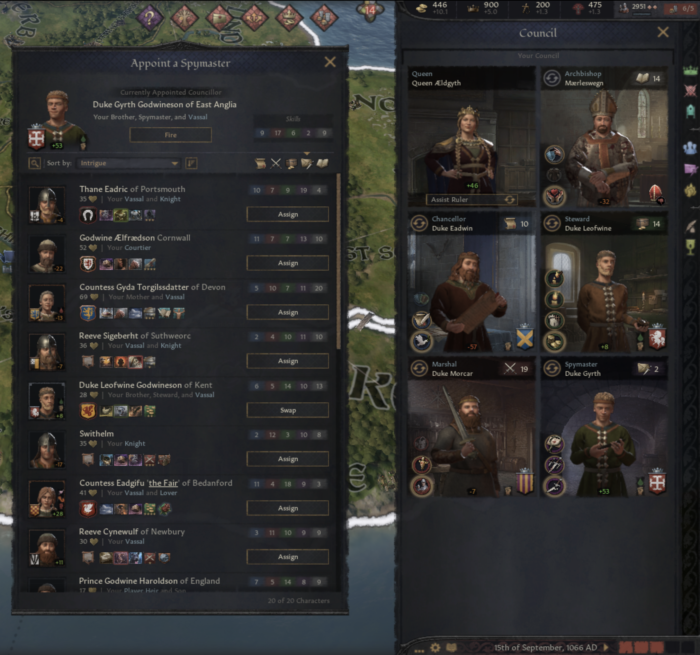In Crusader Kings 3, traits play a crucial role in determining what makes a great vassal. Positive traits such as Content, Trusting, Humble, Patient, and Craven promote loyalty and reduce the likelihood of vassals challenging authority or joining factions.
On the other hand, negative traits like Ambitious, Arrogant, Impatient, and Brave can lead to rebellious behavior and plots against their liege. Additionally, cultural and religious compatibility should be considered when selecting vassals, as differences in these aspects can impact vassal opinion and potentially lead to faction creation.
Lastly, appointing family members as vassals can consolidate power within the dynasty but may also create conflicts, while having friends as vassals can enhance stability and foster cooperation within the realm.
- Choose vassals with positive traits.
- Avoid vassals with negative traits.
- Consider cultural and religious compatibility.
- Prioritize vassals with high attribute scores.
- Appoint family and friends as vassals.
Traits are the basis of great vassal
The traits possessed by vassals in Crusader Kings 3 have a significant impact on their loyalty and behavior within the realm. Vassals with positive traits are more likely to support their liege, follow commands, and contribute positively to the realm. On the other hand, vassals with negative traits are more likely to challenge authority, join factions, or plot against their liege. It is important to carefully select vassals based on their traits in order to maintain stability and loyalty within the kingdom.
Positive traits which should be great
Certain traits are considered highly desirable for vassals. These traits include Content, Trusting, Humble, Patient, and Craven.
Vassals with the Content trait are generally satisfied with their current position and are less likely to desire more power or challenge your authority. This trait fosters loyalty and reduces the likelihood of vassals joining factions or plotting against you.
Similarly, vassals with the Trusting trait are more inclined to believe and trust their liege. This trait increases their opinion of you, making them more loyal and less likely to act against your interests.
Humble vassals have a lower sense of entitlement and are less likely to desire higher titles or challenge your authority. This trait provides a positive opinion boost towards their liege, fostering loyalty and reducing the likelihood of vassals joining factions or plotting against you.
Patient vassals, on the other hand, are more tolerant and willing to wait for their opportunities. They are less impulsive and less likely to act against your interests. This trait also contributes to a positive opinion boost towards their liege, promoting loyalty and reducing the likelihood of vassals joining factions or plotting against you.
Lastly, vassals with the Craven trait are easily intimidated and fear conflict. They are less likely to challenge your authority or engage in rebellious activities. This trait provides a positive opinion boost towards their liege, fostering loyalty and reducing the likelihood of vassals joining factions or plotting against you.
Negative traits to avoid
There are also negative traits that should be avoided when selecting vassals. These traits include Ambitious, Arrogant, Impatient, and Brave.
Vassals with the Ambitious trait have a strong desire for power and may seek to increase their own influence or challenge your authority. This trait creates a negative opinion penalty towards their liege, making them more likely to join factions or plot against you.
Similarly, vassals with the Arrogant trait have an inflated sense of self-importance and may disregard your authority or act in a condescending manner. This trait also provides a negative opinion penalty towards their liege, increasing the likelihood of vassals joining factions or plotting against you.
Impatient vassals have a low tolerance for waiting and may act impulsively or make rash decisions. This trait creates a negative opinion penalty towards their liege, making them more likely to join factions or plot against you.
Lastly, vassals with the Brave trait are fearless and less easily intimidated. They may be more willing to challenge your authority or engage in rebellious activities. This trait provides a negative opinion penalty towards their liege, increasing the likelihood of vassals joining factions or plotting against you.
Cultural and religious considerations
Impact of different cultures on relationships and opinion
The cultural background of your vassals plays a crucial role in shaping their relationships with you and the overall popular opinion within your realm. If a vassal belongs to a different culture than the local one, it can lead to negative opinion modifiers between characters, especially if cultural acceptance is low. This means that vassals may have a lower opinion of you if they come from a different culture.
Furthermore, the cultural acceptance of the vassal’s culture within the county they govern also affects popular opinion. If the local culture does not accept the vassal’s culture, it can lead to a mismatch and potentially result in the formation of factions and rebellions against your rule. As the top liege, you will have to deal with these uprisings, making it important to consider cultural compatibility when selecting vassals.
Effects of religious differences on opinion and potential faction creation
Religious differences in CK 3 also have a significant impact on vassal opinion and the potential creation of factions. Similar to cultural differences, if you and a vassal have different religions, it can result in negative opinion modifiers between characters. This means that vassals may have a lower opinion of you if your religious beliefs do not align.
Additionally, if a county has a different religion than its vassal, it can lead to reduced popular opinion within that county. This can create a breeding ground for factions based on religious differences, which can pose a threat to your rule. These factions function similarly to those created for cultural reasons but are based on religious disparities.
To maintain stable vassal relationships and prevent faction creation, it is important to consider cultural and religious compatibility when selecting vassals. Choosing vassals who share the same culture and religion as the local population can help maintain positive vassal opinion and prevent potential rebellions based on cultural and religious differences.
Importance of attributes scores
High attribute scores in vassals contribute to their effectiveness in their assigned tasks. Vassals with high scores in stewardship, martial skill, or diplomacy excel in their respective areas, such as managing domains, leading troops, or negotiating alliances.

Skilled vassals in council positions provide benefits by increasing the council’s effectiveness, offering valuable advice to the ruler, and enhancing the ruler’s prestige.
However, highly skilled vassals who dislike the ruler can pose risks by plotting against them or attempting to seize power. It is important for the ruler to manage relationships with skilled vassals to maintain loyalty and mitigate these risks.
Family and friends as vassals
Focused on family
Appointing family members as vassals has its advantages. Family members are naturally inclined to support and be loyal to their ruler, resulting in higher opinion modifiers. They may also possess desirable traits and high attribute scores, making them valuable assets as vassals. Assigning them to council positions can further enhance their effectiveness. Additionally, appointing family members as vassals helps consolidate power within your dynasty, ensuring the longevity and stability of your rule.
However, there are disadvantages to appointing family members as vassals. Ambitious family members may have their own agendas and plot against you, creating internal conflicts and instability. Appointing too many family members as vassals can limit strategic marriage opportunities, hindering alliances and strengthening your position. Succession issues may also arise, leading to conflicts over inheritance and potential succession wars.
Focused on friends
Having friends as vassals also has its benefits. Friends are less likely to plot against you and have a positive opinion of you, maintaining stability within your realm. They are more likely to support your decisions and policies, actively contributing to your realm’s prosperity. Having friends as vassals can strengthen personal relationships and foster cooperation and collaboration within your realm.

In terms of plotting, friends as vassals lower the risk of betrayal and involvement in hostile schemes. They can also be valuable allies in managing factions, supporting you in suppressing rebellious factions and swaying other vassals to your side. Overall, having friends as vassals improves the stability of your realm and maintains a harmonious ruling environment.
More articles about governance in CK3
All ways how to get vassals in CK3 available in game, which fits your character?
Tips how to find great vassal in CK3 for your duchy.
Too many vassals in CK3, how to prevent, potential problems, how to solve it.
Problems with too many duchies and how to solve this with vassals.
Where to click if you want to move capital and what consider when you want to do it?
How to play CK3 without vassals? Analysis if is possible to play without them and how.
More informations about Crown Authority and how affects vassals.
Proven tips how to stop your fighting vassals? and how keep them weak.
Vassals stances deeply explained and how affects Crusader Kings 3
Guide how to get rid of problematic vassal in CK3 with various methods.
Detailed guide how to work with Theocratic vassals and how get them.
Guide how to increase vassal’s opinion on you.
